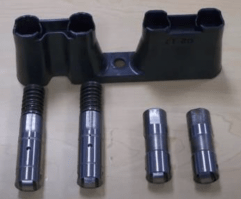If you’ve ever experienced engine trouble, you know how frustrating, disruptive and expensive it can be. From strange noises to reduced power and performance, engine issues can wreak havoc on your vehicle and your schedule. One issue that has been reported by some drivers, particularly those with General Motors (GM) vehicles, is premature lifter failure. In this post, we’ll explore what a lifter is, how its failure can affect your engine, and what we can do to help.
First, let’s explain what we mean by “lifters.” Lifters are a key component of an engine’s valve train system, and their job is to help open and close the engine’s valves at the right time. The lifters are located between the camshaft and the pushrods, and they are typically made of metal and coated in a layer of oil to help reduce friction.
When lifters fail, they can cause a variety of issues, including reduced power and performance, engine noise, hesitation and vibration, and even complete engine failure. Premature lifter failure, in particular, is a concern for some drivers, as it can occur in relatively new or well-maintained engines and lead to significant damage.
One potential cause of premature lifter failure in GM vehicles is the use of Active Fuel Management (AFM) lifters. For reference, AFM lifters are shown on the left in this image, while regular lifters are shown on the right. AFM lifters are designed to deactivate some of the engine cylinders under certain conditions to improve fuel efficiency. However, some drivers have reported lifter failure in vehicles equipped with AFM lifters, which has led to class-action lawsuits and other lemon law actions.
One of the specific allegations is that the lifters were manufactured with insufficient oiling, causing them to fail prematurely due to wear and tear. GM owners also allege that the AFM system itself can contribute to premature lifter failure, as the system’s deactivation of certain cylinders can cause uneven wear and tear on the lifters and other engine components. The problems have occurred in a variety of GM vehicles, including the Chevrolet Silverado, Yukon, GMC Sierra, and the Chevy Tahoe.
If you own a GM vehicle with AFM lifters, it’s important to stay up-to-date on any recalls or service bulletins related to your vehicle’s engine. If you suspect that your engine may be experiencing premature lifter failure, it’s important to have it inspected by a qualified GM service center as soon as possible. Ignoring the issue can cause further damage to the engine and potentially lead to a complete engine failure.
We have represented numerous consumers in lemon law actions whose vehicles have experienced failed AFM lifters. Often times, clients have reported certain lifters were replaced in their GM vehicles, only to find another repair is needed for replacement of the others. Contact us if you’ve had this issue, which may lead to a repurchase of the vehicle or a reduction in its purchase price.
In conclusion, premature lifter failure can be a serious issue for drivers, potentially leading to expensive repairs and engine damage. As consumers, we rely on manufacturers to provide us with safe and reliable products, but recourse is available when they fall short of that expectation. Lemon laws serve as a reminder that even the biggest companies can be held accountable for their mistakes, and that consumers have the power to effect positive change in the marketplace.

 Attorney Douglas Harper earned both his Bachelor for Arts Degree in History and his law degree from Louisiana State University – gaining a great respect for our unique culture and system of law in the process.
Attorney Douglas Harper earned both his Bachelor for Arts Degree in History and his law degree from Louisiana State University – gaining a great respect for our unique culture and system of law in the process. Attorney Drew Nordgren earned his law degree from Louisiana State University and a Bachelor of Arts in economics from George Mason University in Alexandria, Virginia.
Attorney Drew Nordgren earned his law degree from Louisiana State University and a Bachelor of Arts in economics from George Mason University in Alexandria, Virginia.
Recent Comments